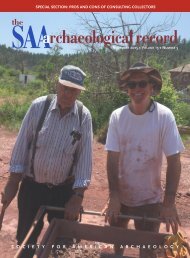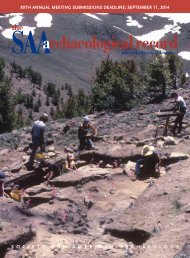SAA
Nov2016_web
Nov2016_web
You also want an ePaper? Increase the reach of your titles
YUMPU automatically turns print PDFs into web optimized ePapers that Google loves.
VIDEO GAMES AND ARCHAEOLOGY<br />
to be ignored or forced out of the gaming space. While there<br />
are organizations, such as the Crash Override Network, that<br />
are working to combat the harassment that can result from<br />
participation with toxic Internet communities, any research<br />
undertaken within video games should be considered in<br />
light of the potential ramifications of engagement.<br />
Moving Forward<br />
Establishing ethical standards and guidelines of practice isn’t<br />
an endeavor that can be one and done. The Internet, considered<br />
not only a repository for disembodied data but also as a<br />
collection of the actions and desires of individuals and<br />
groups, changes with time. Ethical standards need to be<br />
determined for immediate work in archaeogaming but also<br />
need to be constantly reevaluated as the culture of Internet<br />
behavior and interactions changes. As we look at research<br />
concerning the Internet conducted in 1995, or even 2005, it’s<br />
obvious how much the environment has been altered and<br />
changed, especially with the advent of social media (Perry<br />
and Beale 2015). Trying to apply digital ethical standards<br />
from the past to the present isn’t viable, and neither will<br />
applying the standards of 2015 be necessarily applicable in<br />
2025. This isn’t an area for complacency but one of constant<br />
review and vigilance.<br />
As the subfield progresses, and the canon of published<br />
research focused specifically on archaeology within video<br />
games grows, the discipline would do well to look to other,<br />
parallel fields to compare standards of ethical practice and<br />
methods of obtaining data with respect for the populations<br />
involved. The distinction between archaeology and anthropology<br />
is amorphous and often argued, but looking to how cultural<br />
anthropologists conduct research online, as well as to<br />
how sociologists and scholars of game design comport themselves,<br />
gives us comparative standards of practice to examine.<br />
They may not be looking for the same data, but they’re<br />
increasingly looking in the same places, and where they are<br />
now is where we need to go . . . ethically, and responsibly.<br />
Acknowledgments<br />
Thank you to Colleen Morgan for inclusion in this issue, to<br />
the users of the #archaeogaming hashtag, and to the players<br />
and archaeologists whose many conversations encouraged<br />
this discussion.<br />
References Cited<br />
Boellstorff, Tom, Bonnie Nardi, Celia Pearce, and T. L. Taylor<br />
2012 Ethnography and Virtual Worlds: A Handbook of Method.<br />
Princeton University Press, Princeton, New Jersey.<br />
Chess, Shira, and Adrienne Shaw<br />
2015 A Conspiracy of Fishes, or, How We Learned to Stop Worrying<br />
About #GamerGate and Embrace Hegemonic Masculinity.<br />
Journal of Broadcasting & Electronic Media 59(1):208–220.<br />
Entertainment Software Association<br />
2015 Essential Facts about the Computer and Video Game<br />
Industry. Electronic document, http://www.theesa.com/wpcontent/uploads/2015/04/ESA-Essential-Facts-2015.pdf,<br />
accessed October 13, 2016.<br />
Perry, Sara, and Nicole Beale<br />
2015 The Social Web and Archaeology’s Restructuring: Impact,<br />
Exploitation, Disciplinary Change. Open Archaeology 1(1):153–<br />
165.<br />
Sicart, Miguel<br />
2013 Moral Dilemmas in Computer Games. Design Issues<br />
29(3):28–37.<br />
Reinhard, Andrew<br />
2015 Archaeogaming: Tools and Methods. Electronic document,<br />
https://archaeogaming.com/2015/09/18/archaeogaming-toolsand-methods/,<br />
accessed October 12, 2016.<br />
Wijaya, St. Wisnu, Jason Watson, and Christine Bruce<br />
2013 Addressing Public and Private Issues in a Virtual Ethnography<br />
Study of an Open Online Community: a Reflective Paper.<br />
Electronic document, http://eprints.qut.edu.au/61858/1/<br />
Ethics_Issues_Virtual_Ethnography_Online_Community.pdf,<br />
accessed October 13, 2016.<br />
November 2016 • The <strong>SAA</strong> Archaeological Record<br />
33




